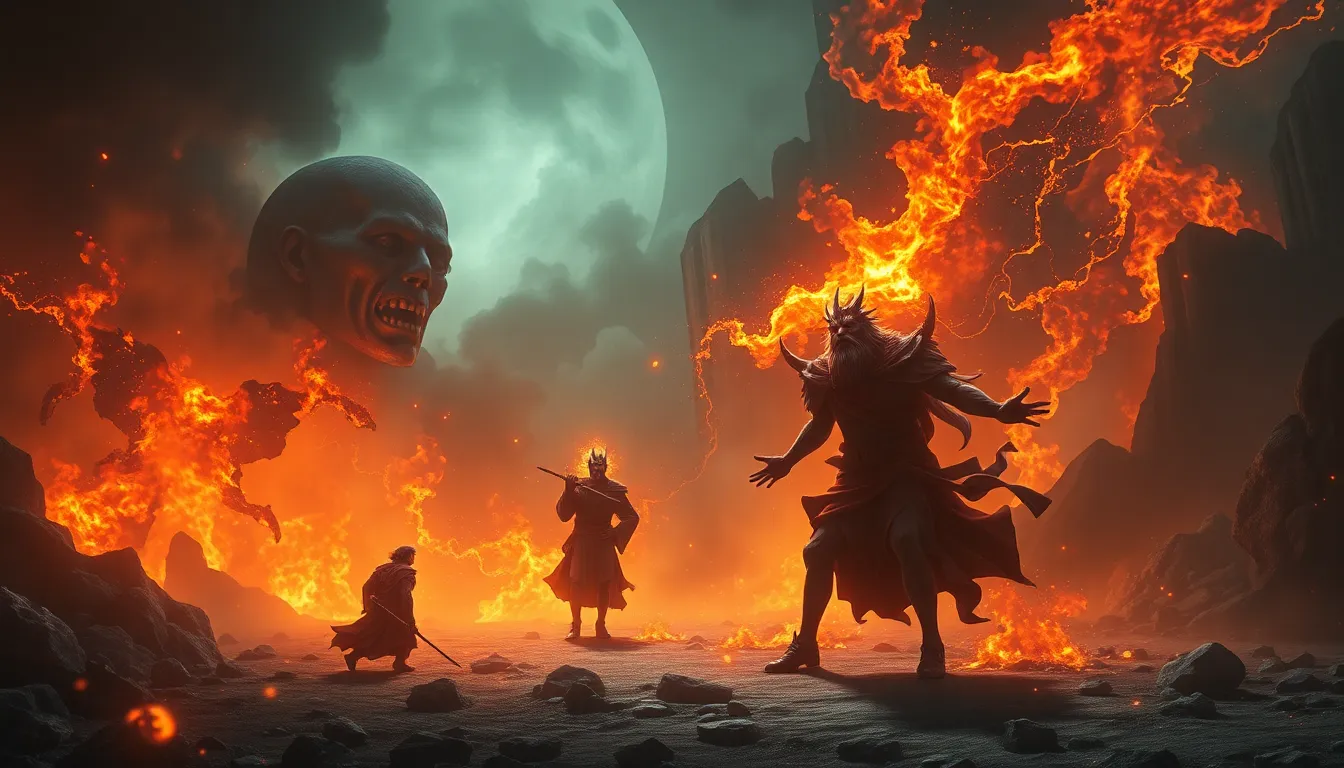The Myth of the Eternal Struggle: Morality in Conflict
I. Introduction
Morality, often defined as the differentiation between right and wrong, serves as the foundation for human interaction and societal norms. Its importance cannot be overstated, as it informs our decisions, shapes our cultures, and guides our laws. The concept of the “eternal struggle” suggests that conflict is a fundamental aspect of human existence, often driven by differing moral beliefs and values.
This article aims to explore the interplay between morality and conflict, examining how moral disputes have shaped historical events, influenced societal structures, and continue to affect contemporary issues.
II. Historical Perspectives on Morality and Conflict
A. Ancient Civilizations and Moral Codes
Throughout history, ancient civilizations have developed moral codes that dictated acceptable behavior. The Code of Hammurabi, for instance, established laws based on a principle of justice that reflected the moral values of Babylonian society.
B. The Role of Religion in Defining Ethical Conflicts
Religion has played a crucial role in shaping moral frameworks across cultures. Various religious texts, from the Ten Commandments in Christianity to the Quran in Islam, provide guidelines for ethical behavior, often leading to conflicts when interpretations diverge.
C. Case Studies: Notable Conflicts Shaped by Moral Disputes
- The Crusades: A series of religious wars driven by differing moral and ethical beliefs between Christians and Muslims.
- The American Civil War: A conflict rooted in moral disputes over slavery and human rights.
- The Rwandan Genocide: A tragic example of ethnic conflict fueled by deep-seated moral and societal divisions.
III. The Nature of Moral Conflicts
A. Types of Moral Conflicts: Personal, Societal, and Global
Moral conflicts can manifest at various levels, including personal dilemmas, societal disputes, and global crises. Personal moral conflicts often involve individual choices, while societal conflicts may arise from differing group values. Global conflicts, such as climate change negotiations, highlight the complexities of addressing moral issues on an international scale.
B. Psychological Underpinnings of Moral Decision-Making
The psychology behind moral decision-making is intricate. Factors such as upbringing, personal experiences, and cognitive biases influence how individuals perceive moral dilemmas and make choices.
C. The Influence of Culture on Moral Beliefs and Conflicts
Cultural backgrounds significantly shape moral beliefs. What is considered moral in one culture may be viewed differently in another, leading to misunderstandings and conflicts. For instance, collectivist cultures may prioritize group harmony, while individualist cultures emphasize personal rights.
IV. The Dichotomy of Good vs. Evil in Moral Frameworks
A. Philosophical Theories: Utilitarianism vs. Deontological Ethics
Two prominent philosophical theories, utilitarianism and deontological ethics, provide contrasting approaches to morality. Utilitarianism advocates for actions that maximize overall happiness, while deontological ethics focuses on adherence to moral rules regardless of consequences. This dichotomy often leads to ethical conflicts in decision-making.
B. The Role of Narratives in Shaping Perceptions of Good and Evil
Narratives play a powerful role in framing moral conflicts. Stories, whether in literature, film, or politics, can shape public perceptions of good and evil, influencing how societies respond to moral issues.
C. The Impact of Media on Moral Judgments
The media serves as a crucial platform for shaping moral judgments. Coverage of events can skew public perception, leading to polarized views on moral issues. Social media, in particular, amplifies the voices of dissent and can create echo chambers that reinforce existing beliefs.
V. The Role of Power and Politics in Moral Conflicts
A. Political Ideologies and Their Moral Foundations
Political ideologies are often rooted in moral beliefs. For example, socialism emphasizes equality and social welfare, while capitalism prioritizes individual freedom and economic growth. These differing foundations can lead to profound moral conflicts in governance and policy-making.
B. Case Studies: Wars and Conflicts Driven by Moral Assertions
- The Vietnam War: A conflict shaped by moral and ideological differences between communism and democracy.
- The Gulf War: Driven by moral imperatives to protect human rights against tyranny.
C. The Intersection of Morality and Nationalism
Nationalism often intertwines with moral beliefs, leading to conflicts based on perceived national interests. Nationalistic fervor can sometimes justify actions that conflict with broader moral principles, such as humanitarian concerns.
VI. Morality in the Context of Modern Conflicts
A. Social Movements and Their Moral Implications
Modern social movements, such as Black Lives Matter and climate activism, are fundamentally moral in nature. They challenge existing norms and push for systemic change, often facing resistance from established powers.
B. Environmental Ethics and Global Challenges
As global challenges like climate change escalate, environmental ethics emerge as a significant moral concern. The debate over resource allocation, intergenerational justice, and the rights of nature illustrates the complexity of moral decision-making in the face of ecological crises.
C. Technological Advancements and New Moral Dilemmas
Technological advancements bring forth new moral dilemmas, such as privacy concerns in the digital age and ethical considerations in artificial intelligence. These challenges require reevaluation of existing moral frameworks to address emerging issues.
VII. The Psychological Impact of Moral Conflicts
A. Cognitive Dissonance and Moral Decision-Making
Cognitive dissonance occurs when individuals face conflicting moral beliefs, leading to discomfort and stress. This psychological conflict can impact decision-making, often resulting in rationalizations or changes in beliefs to alleviate the tension.
B. The Effects of Moral Conflicts on Mental Health
Moral conflicts can have profound effects on mental health, contributing to anxiety, depression, and identity crises. Individuals grappling with moral dilemmas may seek therapy or support to navigate their feelings.
C. Strategies for Resolving Moral Conflicts
- Open Dialogue: Engaging in conversations with differing viewpoints can promote understanding.
- Empathy: Practicing empathy helps individuals appreciate the perspectives of others.
- Compromise: Finding middle ground can lead to solutions that respect diverse moral beliefs.
VIII. Re-examining the Myth: Is Conflict Inevitable?
A. Alternative Perspectives on Conflict Resolution
While conflict may seem inevitable, alternative perspectives suggest that it can be managed or resolved through constructive approaches. Emphasizing collaboration over confrontation can lead to more harmonious outcomes.
B. The Role of Dialogue in Bridging Moral Divides
Dialogue serves as a powerful tool for bridging moral divides. By fostering respectful conversations, individuals and groups can work together to find common ground and resolve disputes.
C. Historical Examples of Non-Violent Conflict Resolution
- The Civil Rights Movement: Achieved significant progress through non-violent protest and dialogue.
- India’s Independence: Led by Mahatma Gandhi’s philosophy of non-violent resistance.
IX. The Future of Morality in Conflict
A. Emerging Trends in Global Ethics
As the world becomes more interconnected, emerging trends in global ethics highlight the need for a shared moral framework. Issues such as human rights, environmental protection, and social justice demand collective moral action.
B. The Role of Education in Shaping Moral Perspectives
Education plays a crucial role in shaping moral perspectives, fostering critical thinking, and encouraging empathy. By integrating ethics into curricula, future generations can be better equipped to navigate moral complexities.
C. Potential for a Shared Moral Framework in a Globalized World
In an increasingly globalized world, the potential for a shared moral framework exists. Collaborative efforts to address global challenges can lead to a more unified approach to morality that transcends cultural boundaries.
X. Conclusion
A. Summary of Key Insights
The exploration of morality in conflict reveals that while moral disputes often lead to conflict, they can also serve as catalysts for positive change. Understanding the complexities of moral beliefs and their historical contexts is crucial for navigating contemporary issues. Ultimately, the path to resolving moral conflicts lies in dialogue, empathy, and a commitment to shared values.



